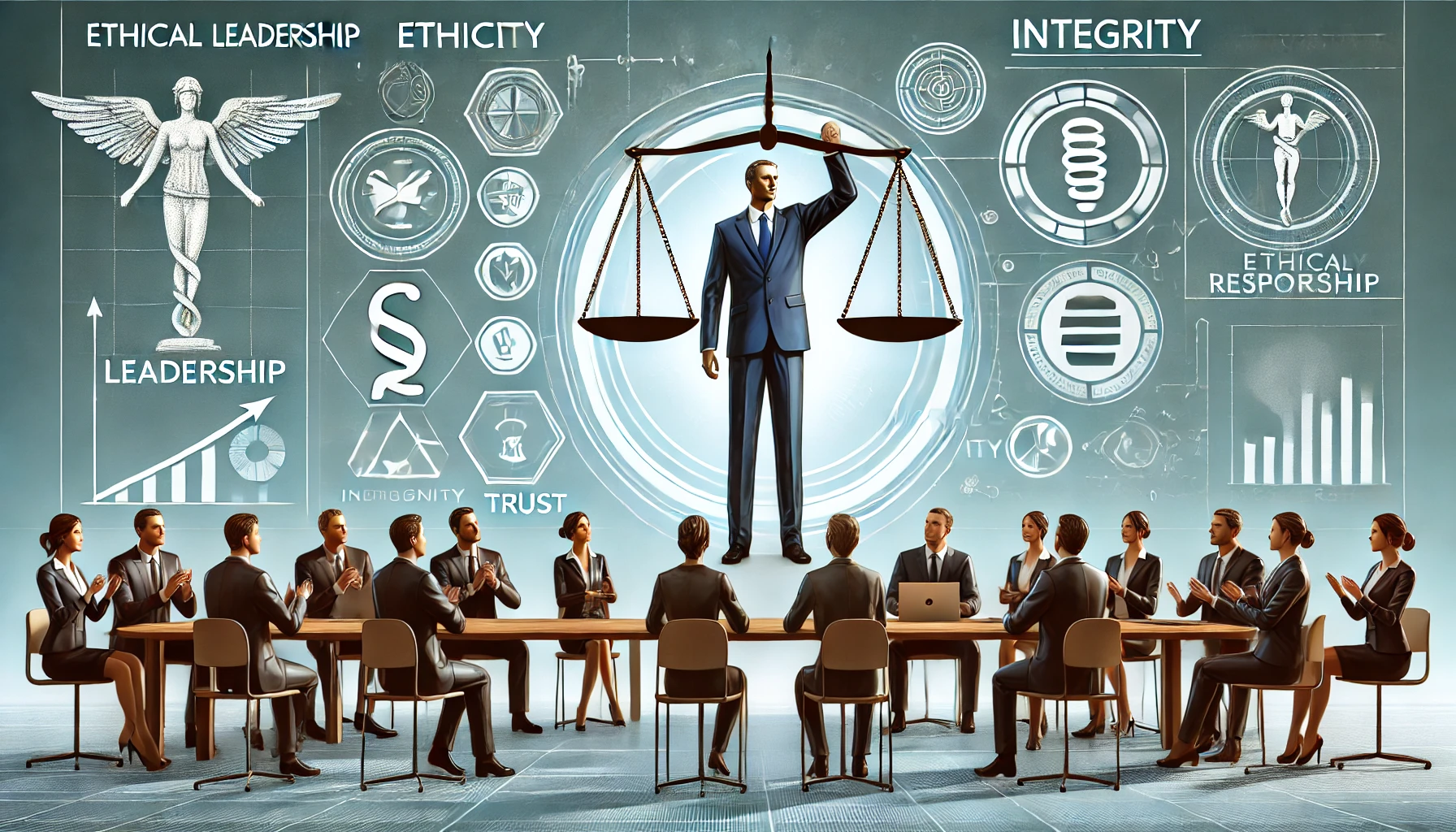Introduction: The Importance of Ethical Leadership in Today’s World 🌍
In a fast-paced and competitive global landscape, the need for ethical leadership has never been more pressing. Ethical leaders are those who lead with integrity, honesty, and fairness, balancing business goals with the moral values that foster trust, loyalty, and respect. Ethical leadership is not just about what decisions are made but how those decisions are reached and implemented.
The demand for ethical leadership has been driven by increasing awareness among stakeholders—customers, employees, and society at large—who expect accountability, transparency, and moral conduct from organizations. Great leadership today is not only measured by business performance but also by the ethical frameworks that guide those in positions of authority.
In this blog, we’ll explore what ethical leadership is, its key principles, the traits of an ethical leader, and how you can incorporate ethical leadership practices into your daily decisions to create an environment where trust, respect, and transparency reign supreme.
What Is Ethical Leadership? 🤔
Ethical leadership is a style of leadership that is grounded in values like integrity, fairness, honesty, and respect. It involves making decisions that prioritize moral principles and setting an example of ethical behavior for others to follow. Ethical leaders aim to create a culture of fairness and accountability by consistently modeling the right behaviors, even when it’s difficult.
How Ethical Leadership Works 🛠️
At its core, ethical leadership is about the consistent application of moral principles in decision-making and behavior. Ethical leaders weigh the needs of their stakeholders—including employees, customers, and shareholders—while also considering the greater good. They maintain a balance between ethics and business performance by prioritizing integrity over profits and ensuring that their actions align with both the company’s values and the expectations of society.
Example: Imagine a company that is pressured to meet quarterly earnings but discovers a product defect that could harm users. An ethical leader would prioritize public safety over short-term profit, initiate a recall, and communicate transparently with customers, even if it means a financial loss in the short run.
Key Principles of Ethical Leadership 📜
Here are the 6 core principles that form the foundation of ethical leadership:
1. Fairness ⚖️
Ethical leaders make decisions that are fair and just, treating everyone equally and without bias. Whether it’s about promotions, resource allocation, or discipline, fairness ensures that decisions are made based on merit and facts, not favoritism or politics.
2. Accountability 🔍
Accountability is about taking responsibility for your actions and their consequences. Ethical leaders are accountable to their employees, customers, and stakeholders. They don’t pass the blame when things go wrong and are transparent about challenges and mistakes.
3. Trust 🤝
Building trust is the cornerstone of ethical leadership. Trust is earned when leaders act with integrity, communicate honestly, and consistently follow through on promises. Without trust, teams can’t function effectively, and organizational morale suffers.
4. Honesty 💬
Honesty isn’t just about telling the truth—it’s about being open and transparent in your dealings. Ethical leaders are honest in all their communications, sharing information that is accurate and clear, even when the news is difficult or unfavorable.
5. Respect 👥
An ethical leader treats everyone with dignity and respect, valuing the contributions of others and creating a culture where people feel heard and valued. This involves being empathetic, encouraging diverse viewpoints, and fostering an inclusive environment.
6. Equality 👩⚖️
Promoting equality means ensuring that everyone in the organization has equal opportunities for growth and success. Ethical leaders fight discrimination and work toward creating a workplace where diversity and inclusion are part of the organizational fabric.
Traits of an Ethical Leader 🏅
A great ethical leader embodies certain qualities that make them stand out. Let’s explore the 8 essential traits that define an ethical leader:
1. Integrity
Integrity means having the company’s best interests at heart, both financially and morally. Ethical leaders make decisions that align with the organization’s values, ensuring that both the business and its people thrive.
2. Safety
They develop a psychologically safe workplace for employees, where individuals feel secure enough to express their ideas and concerns without fear of retribution.
3. Leads by Example
Ethical leaders lead by doing, not just talking. They embody the behaviors they want to see in their team, from hard work and commitment to treating others with kindness and respect.
4. Trustworthy
Being trustworthy means that people can count on you to do the right thing. Ethical leaders build strong bonds of trust with their teams by being reliable and consistent in their actions.
5. EDI (Equality, Diversity, and Inclusion)
An ethical leader promotes equality, diversity, and inclusion. They actively work to eliminate discrimination and foster an environment where all employees feel valued, regardless of their background.
6. Transparency
Transparency is crucial for fostering trust. Ethical leaders are open about their decisions, motivations, and the challenges the company faces. They communicate openly about goals, changes, and risks, ensuring no one is left in the dark.
7. Empathetic
They show empathy and compassion, understanding the emotional needs and concerns of their employees and colleagues. This builds strong relationships and enhances loyalty within the team.
8. Socially Responsible
An ethical leader is socially responsible, not only to the organization but also to society at large. They understand the impact of the company’s actions on the community and work toward corporate social responsibility (CSR) goals that benefit both society and the business.
Ethical Leadership Style: The Guiding Approach 🔄
There are various styles of leadership, but ethical leaders stand out due to their emphasis on values-based decision-making. Ethical leaders are driven by the following behaviors:
Two-Way Communication: They foster open dialogue and listen to the concerns and feedback of their team.
Virtue Signaling: They lead by setting examples of high moral standards and ethical behavior.
Fair Decision-Making: Decisions are made by weighing fairness and justice, with transparency as the foundation.
Corrective Action: Ethical leaders don’t shy away from correcting unethical behavior or actions, even when it’s uncomfortable.
Rewarding Moral Behavior: They celebrate and recognize employees who demonstrate ethical behavior, creating a positive feedback loop.
Altruistic Action: Ethical leaders put others before themselves, focusing on what benefits the team and organization as a whole.
The 4V Model of Ethical Leadership by Bill Grace 📘
The 4V Model is a framework for ethical leadership that helps leaders integrate moral values into their leadership style. The model consists of four core components:
1. Values
Ethical leaders are guided by strong moral values. These values act as the foundation for all decision-making and interactions.
2. Vision
Leaders with ethical vision understand the long-term impact of their decisions, not just for the organization but for society. They lead with a purpose that extends beyond profits.
3. Voice
Ethical leaders use their voice to speak out against injustices and advocate for moral behavior. They encourage their teams to raise concerns and address problems early.
4. Virtue
Virtue is the practice of moral excellence. Ethical leaders strive to embody virtues like honesty, empathy, and fairness in every aspect of their leadership.
The 4V Model emphasizes that ethical leadership is not just about doing the right thing but about embedding moral principles into every decision, interaction, and strategy.
How to Apply Ethical Leadership in Your Organization 🏢
If you want to bring ethical leadership into your workplace, here are some actionable steps to get started:
1. Establish a Code of Ethics
Create a clear and comprehensive code of ethics that outlines the behaviors and principles expected from every employee, from top leadership to junior staff.
2. Lead by Example
Always demonstrate ethical behavior in your decisions, communication, and interactions. Ensure that your actions align with the values you promote within the company.
3. Foster Open Communication
Encourage a culture where employees feel safe to express concerns, provide feedback, and report unethical behavior. Regularly hold meetings where ethics are discussed openly.
4. Reward Ethical Behavior
Recognize and reward employees who demonstrate ethical behavior. This not only reinforces the desired behaviors but also shows that the company values moral excellence.
5. Implement Ethical Decision-Making
When making decisions, consider both the business impact and the moral implications. Weigh the consequences on all stakeholders and prioritize fairness and integrity over short-term gains.
Conclusion: Become the Ethical Leader People Follow Voluntarily 🌟
Ethical leadership isn’t just about doing what’s right—it’s about inspiring others to follow that example. When you lead with integrity, fairness, and transparency, you create an environment where people trust you and feel motivated to do their best.
As Brian Tracy said, “Become the kind of leader that people would follow voluntarily even if you had no title or position.” This is the essence of ethical leadership: It’s about fostering trust, upholding moral values, and inspiring others to lead by example.
By adopting the principles and traits of ethical leadership, you can create an organization where trust, loyalty, and integrity drive success, both in business and in society.


















